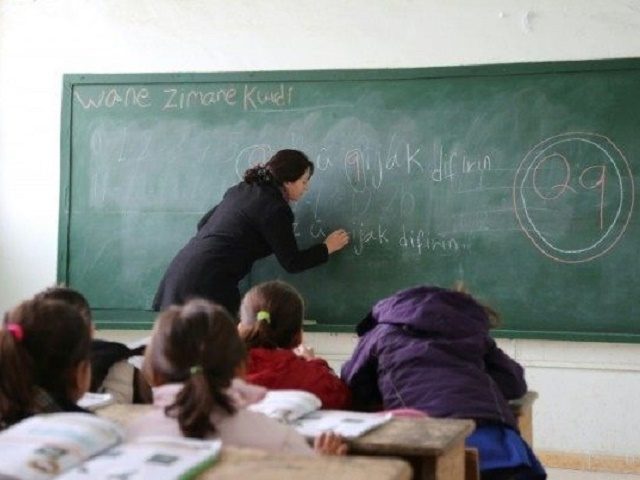The Qatar Foundation has been funding U.S. K-12 public schools, seeking to ramp up their Arabic language and cultural curricula with an eye toward globalization.
According to a report in the Wall Street Journal (WSJ):
The Qatar Foundation gave $30.6 million over the past eight years to several dozen schools from New York to Oregon and supporting initiatives to create or encourage the growth of Arabic programs, including paying for teacher training, materials and salaries. The funding came through Qatar Foundation International, the foundation’s U.S. arm.
“We are going to definitely look at ways to expand in the future,” said Omran Hamad Al-Kuwari, executive director of the Qatar Foundation’s CEO office. “We’ve been quite surprised about the interest.”
Similarly, Maggie Mitchell Salem, QFI’s executive director, says the foundation “partners” with U.S. school districts “to advance Arabic language learning and the understanding of Arab culture to develop global competency and critical 21st century skills that young Americans need to compete globally.”
The WSJ report continues that – after Spanish – Arabic “is the language most spoken by students learning English as a second language at U.S. public schools, and the percentage of speakers is growing at a faster rate than other top languages, according to a review of data from the National Center for Education Statistics.”
Qatar Foundation International (QFI) also states:
The study of Arabic as a foreign language has risen in popularity and has seen a surge in American student interest over the past decade. Surveys conducted by the Modern Language Association (MLA) in 2006 and
2009 found that American student enrolment in Arabic language courses grew by 126.5% from 2002 to 2006 and then again by another 46.3% between 2006 and2009, making Arabic the fastest-growing area of foreign language study in the US. Despite this growing national interest, in-school programs have struggled to keep pace.
However, Qatar – home to a U.S. military base – has been the subject of much controversy since Saudi Arabia, Bahrain, Egypt, and the United Arab Emirates severed ties with it in June, accusing the energy-rich nation of supporting terrorist groups.
The Associated Press reported:
Saudi Arabia said it took the decision to cut diplomatic ties due to Qatar’s “embrace of various terrorist and sectarian groups aimed at destabilizing the region” including the Muslim Brotherhood, al-Qaida, the Islamic State group and groups supported by Iran in the kingdom’s restive Eastern Province. Egypt’s Foreign Ministry accused Qatar of taking an “antagonist approach” toward Cairo and said “all attempts to stop it from supporting terrorist groups failed.”
This week, Qatar announced it would be returning its ambassador to Iran, fueling further the ire of its Arab neighbors.
Qatar has also historically been a major supporter of the Clinton Foundation, even though the Hillary Clinton State Department expressed its “continuing human rights concerns” about the Arab state – including in the areas of “freedom of religion … trafficking in persons … legal, institutional, and cultural discrimination against women.”
As Breitbart News reported in October of 2016, despite the “concerns” of the Clinton State Department about Qatar’s alleged human rights violations, “Qatar has donated $1,000,000 to $5,000,000 to the Clintons, with many of those high-dollar donations flooding in while Hillary Clinton was serving as Secretary of State.”
Al-Kuwari, however, according to WSJ, dismisses any suggestion that QFI is tied to terrorist groups.
“There’s a lot of PR wars going on,” he said. “Everybody that comes to Qatar knows what we are about.”
Though other Arab nations contribute to American colleges and universities, Qatar seems especially interested in donations to U.S. K-12 public schools. The public school districts that have sought QFI’s money say they have an eye on globalization.
In September of 2016, QFI – which, according to WSJ, does not reveal its funding sources – announced its awards of $111,069 to the Tucson Unified school district in Arizona and $68,305 to the Minneapolis Public school district (MPS), “aimed at expanding their Arabic programs and existing partnership with QFI.”
According to the announcement of the awards, MPS is the only district that offers Arabic from an elementary level to a high school level in the Twin Cities.
“With the grant award, MPS will solidify the Arabic pathway from Lyndale Elementary School, Ramsey Middle School, to Washburn High School,” QFI states.
“Minneapolis Public Schools believes in providing an urban education that prepares students to be global citizens,” said superintendent Ed Graff. “Thanks to this partnership, our students will have even more opportunities to learn important languages useful for both college and career.”
QFI explained that its award to Tucson Unified would “establish an Arabic feeder program” from the district’s original program at Cholla Magnet High School to include another high school, an elementary school, and a middle school.
“Tucson Unified is committed to offering a global education, and we are excited that this partnership allows us to expand opportunities for our students and our community to learn more about the world,” said superintendent H.T. Sanchez.
Breitbart Texas reported in May of 2016 that QFI granted $100,000 to the Austin Independent School District in Texas to promote Arabic language and culture classes, making it the third school district in the state to accept funds from the foundation. The grant funds teacher salaries, curriculum, and instructional materials.
WSJ reports as well that The Washington Latin Public Charter School in Washington, D.C., first applied to the Qatar Foundation in 2009. Retired headmaster Martha Cutts said she quickly accepted the QFI’s offer to fund an Arabic program at her school, which has since reportedly received about $1.04 million from QFI.
“The program has grown every year,” Cutts said. “I think it allows for our students to be better informed citizens.”

COMMENTS
Please let us know if you're having issues with commenting.